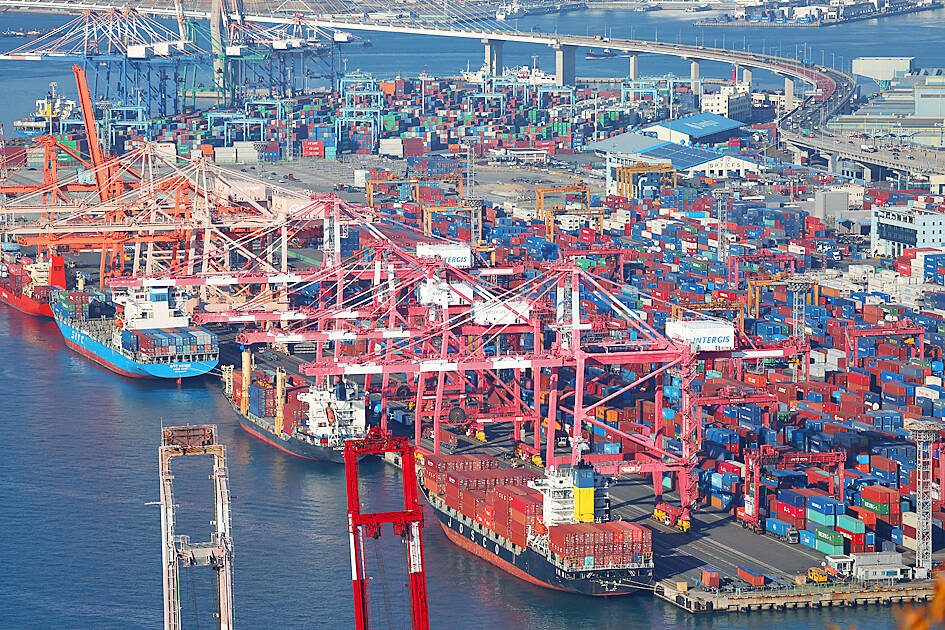South Korea’s export growth returned to a double-digit clip last month, an outcome that bodes well for the economic outlook and reflects the resilience of global demand for technology products.
Shipments that reflect working-day differences increased 13.7 percent from a year earlier, according to data released yesterday by the Korea Customs Service.
Without the adjustment, headline exports rose 11.4 percent while overall imports increased by 6 percent. The trade surplus came to US$3.8 billion.

Photo: EPA-EFE
Exports are the leading engine of South Korea’s economic growth, with semiconductors, cars and refined oil products among the key products that drive the overall performance. Authorities expect the nation’s economic growth to accelerate to the mid-2 percent range this year, thanks in part to a resurgence in global trade.
In particular, a global frenzy for artificial intelligence (AI) development has been a boon for South Korean chipmakers, including Samsung Electronics Co and SK Hynix Inc.
Last month, semiconductor exports rose 38.8 percent from a year earlier, according to yesterday’s data. South Korea accounts for the largest share of global memorychip sales.
Demand has been led by major economies such as the US, where Nvidia Corp has pioneered the development of AI chips, and where booming demand for electric vehicles has benefited South Korea’s carmakers. China has also been a major buyer of the country’s electronics and chips.
The US has at times outweighed China as a source of demand for South Korean products since late last year, marking a turning point in Seoul’s relations with its two largest trading partners.
South Korea has encouraged exporters to diversify their sales routes to reduce exposure to geopolitical risks stemming from simmering trade tensions between Washington and Beijing. China’s cloudy economic outlook creates another incentive.
“There are risks to increasing trade dependence on the United States, such as possible shocks to the financial, fiscal, and business environments,” Je Heon Kim, interim director at the Korea Economic Institute of America, said in a note.
“South Korea must prepare and manage these risks by continuing to diversify its trade and supply chain,” he said.
South Korea’s manufacturers are embedded across a wide array of global supply chains, and therefore their performance serves as a barometer of the vitality of world commerce.
The nation’s export performance has been a factor deterring South Korea’s central bank from making an early policy pivot.
While the US Federal Reserve is widely expected to start cutting interest rates this month, economists cautiously forecast the Bank of Korea would wait until next month or later to lower rates in a bid to address sluggish consumption.

CAUTIOUS RECOVERY: While the manufacturing sector returned to growth amid the US-China trade truce, firms remain wary as uncertainty clouds the outlook, the CIER said The local manufacturing sector returned to expansion last month, as the official purchasing managers’ index (PMI) rose 2.1 points to 51.0, driven by a temporary easing in US-China trade tensions, the Chung-Hua Institution for Economic Research (CIER, 中華經濟研究院) said yesterday. The PMI gauges the health of the manufacturing industry, with readings above 50 indicating expansion and those below 50 signaling contraction. “Firms are not as pessimistic as they were in April, but they remain far from optimistic,” CIER president Lien Hsien-ming (連賢明) said at a news conference. The full impact of US tariff decisions is unlikely to become clear until later this month

GROWING CONCERN: Some senior Trump administration officials opposed the UAE expansion over fears that another TSMC project could jeopardize its US investment Taiwan Semiconductor Manufacturing Co (TSMC, 台積電) is evaluating building an advanced production facility in the United Arab Emirates (UAE) and has discussed the possibility with officials in US President Donald Trump’s administration, people familiar with the matter said, in a potentially major bet on the Middle East that would only come to fruition with Washington’s approval. The company has had multiple meetings in the past few months with US Special Envoy to the Middle East Steve Witkoff and officials from MGX, an influential investment vehicle overseen by the UAE president’s brother, the people said. The conversations are a continuation of talks that

CHIP DUTIES: TSMC said it voiced its concerns to Washington about tariffs, telling the US commerce department that it wants ‘fair treatment’ to protect its competitiveness Taiwan Semiconductor Manufacturing Co (TSMC, 台積電) yesterday reiterated robust business prospects for this year as strong artificial intelligence (AI) chip demand from Nvidia Corp and other customers would absorb the impacts of US tariffs. “The impact of tariffs would be indirect, as the custom tax is the importers’ responsibility, not the exporters,” TSMC chairman and chief executive officer C.C. Wei (魏哲家) said at the chipmaker’s annual shareholders’ meeting in Hsinchu City. TSMC’s business could be affected if people become reluctant to buy electronics due to inflated prices, Wei said. In addition, the chipmaker has voiced its concern to the US Department of Commerce

STILL LOADED: Last year’s richest person, Quanta Computer Inc chairman Barry Lam, dropped to second place despite an 8 percent increase in his wealth to US$12.6 billion Staff writer, with CNA Daniel Tsai (蔡明忠) and Richard Tsai (蔡明興), the brothers who run Fubon Group (富邦集團), topped the Forbes list of Taiwan’s 50 richest people this year, released on Wednesday in New York. The magazine said that a stronger New Taiwan dollar pushed the combined wealth of Taiwan’s 50 richest people up 13 percent, from US$174 billion to US$197 billion, with 36 of the people on the list seeing their wealth increase. That came as Taiwan’s economy grew 4.6 percent last year, its fastest pace in three years, driven by the strong performance of the semiconductor industry, the magazine said. The Tsai